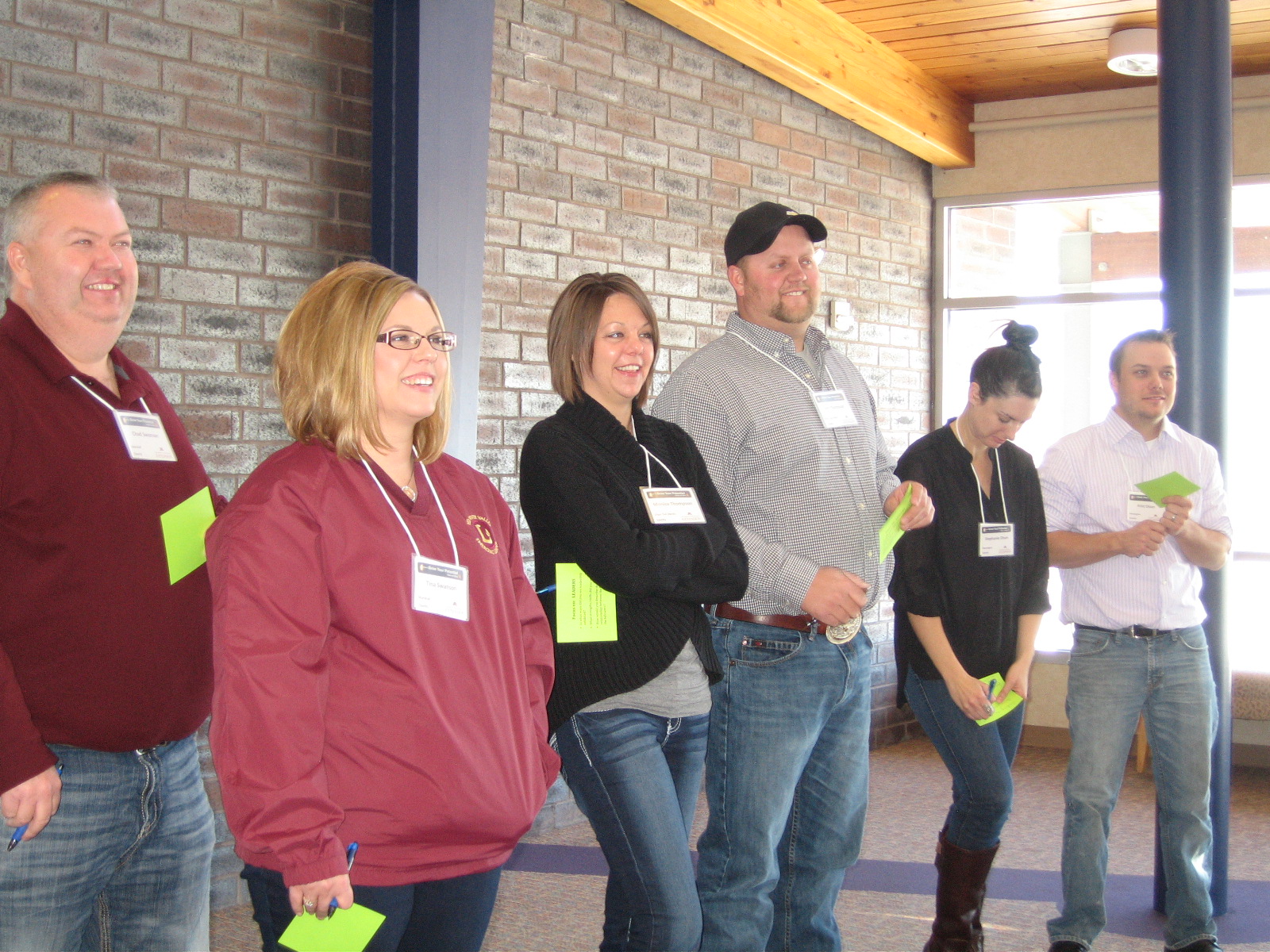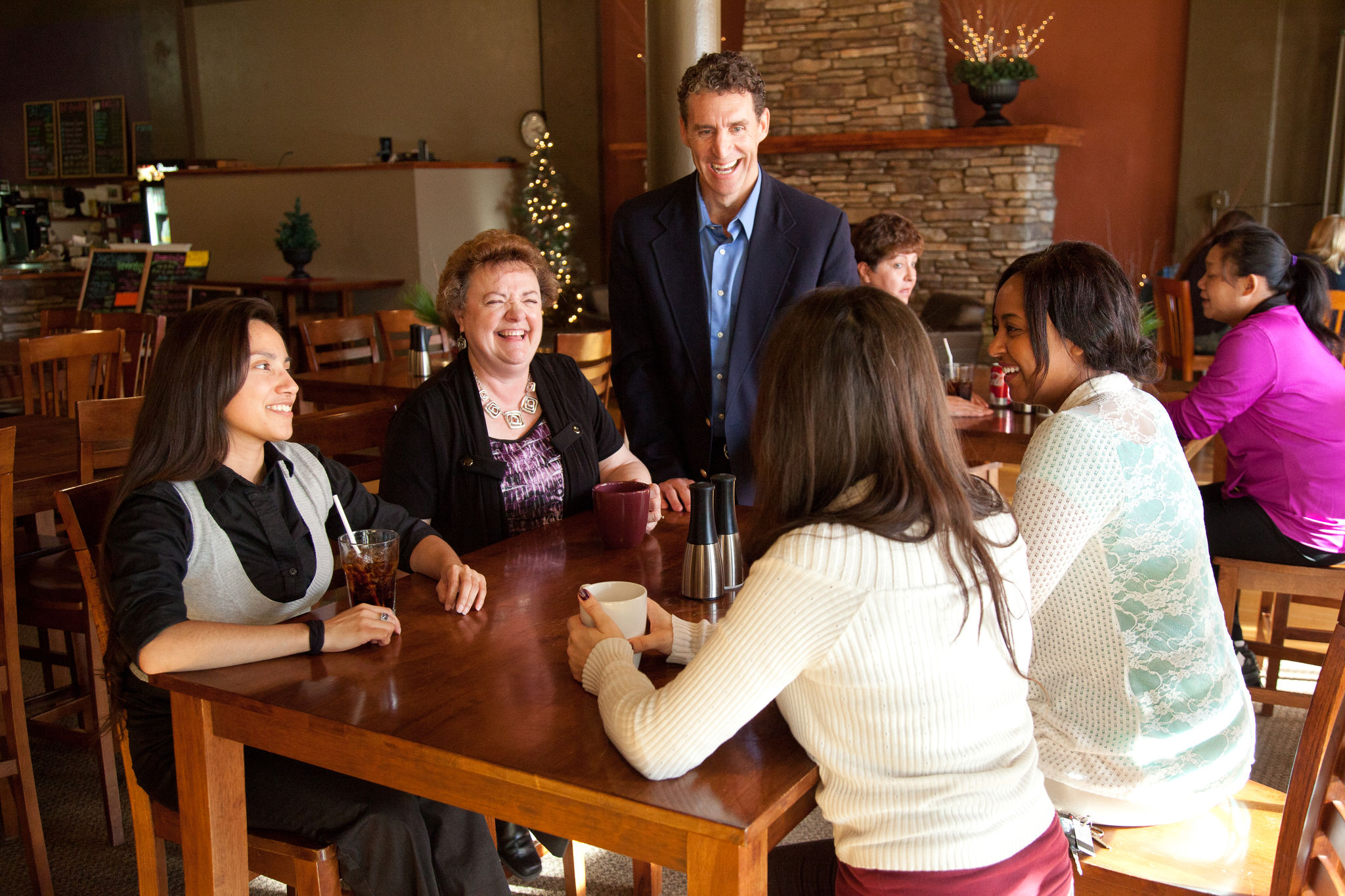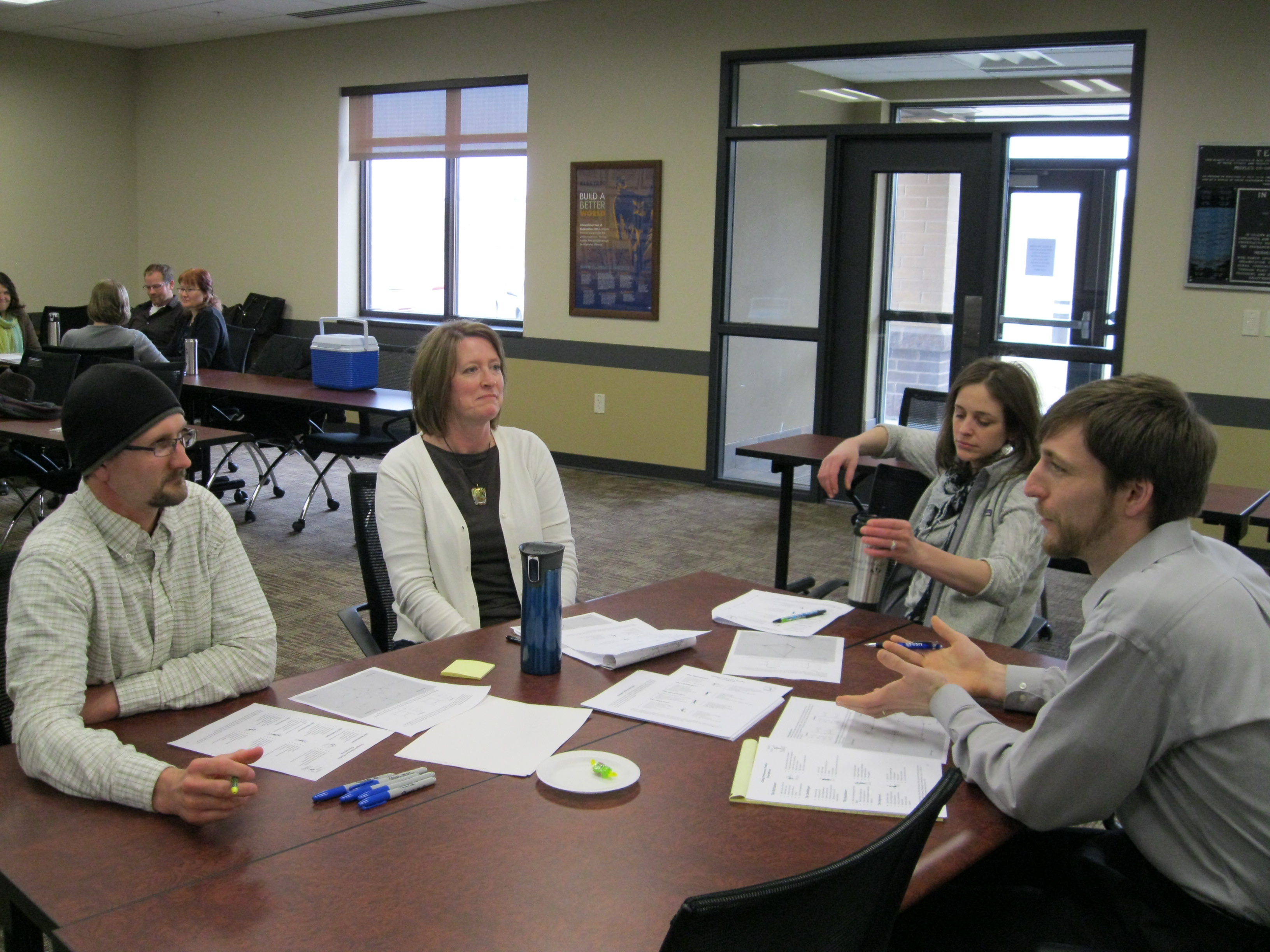Leadership education offerings
About our offerings — the cohort approach
Extension brings leadership education to communities in a cohort group setting that includes 20–30 participants. Our programs are designed with community sponsors and usually last from six to 18 months.
We learn about your community’s interests and needs, then consider ways we can meet your goals. Our purpose is to transform your community members into engaged and active community leaders.
Design your community leadership program
We can help you design an education program. Our team has developed models, based on available research, that can guide us as we design your program together. Your leadership program may include one or more of the offerings tied to the following leadership traits:
- Know yourself and try to understand others
- Communicate effectively and form positive relationships
- Manage change and conflict
- Create successful teams
- Value diversity
- Be a thoughtful decision-maker
- Motivate others
- Conduct successful community meetings
Review our education programs in the following sections, program costs, and then consult with an educator to discuss your community's leadership needs.
Know yourself and try to understand others
You will identify your personal preferences and behaviors — as well as others' — using the Myers-Briggs Type Indicator. Activities and discussion will help you use what you learn from your assessment to improve communication, teamwork and leadership.
People in your community have talents and strengths, and these individual skills must be discovered and developed to help your community thrive. Using the Clifton Strengths assessment, you will learn how to create effective teams and ways to encourage and motivate others. You will also explore the science behind positive emotions, and how they can create healthier environments at home, work and in communities.
Effective leadership in today's complex world requires us to communicate across cultures. In this workshop, you will learn how different cultural styles of communication affect how others make decisions and communicate. You will also create a plan to increase your cultural competency, using the tools and techniques you learned.
Extension can also administer an Intercultural Development Inventory (IDI) to increase your knowledge of your own cultural competency.
Communicate effectively and form positive relationships
This workshop will help you learn how to move people to action, even if you don’t have direct authority (or what to do if you do have direct authority but don’t care to exert it). You will also explore research about power and persuasion so you can better analyze future situations where you have influence.
You will learn how listening behaviors tap one of two types of energy. Effective listening is a skill we can learn — and practice. You will also experience the power that listening has in a conversation, and how to use listening techniques to become the best communicator you can be.
Effective leaders ask good questions. Good questions are purposeful, thought-provoking and timely. In this workshop, you will learn about several different models of questioning. You'll also have an opportunity to practice creating questions for any type of situation.
The benefits of providing effective feedback are well known. In this workshop, you will learn key tips for giving and receiving feedback. You'll also share a tested feedback process and practice bringing the benefits of feedback to your life and work.
Emotional intelligence is a set of emotional and social skills that influence the way we perceive and express ourselves. It helps us develop and maintain social relationships, cope with challenges and use information effectively. Before the workshop, you will take an online assessment called the Emotional Quotient Inventory (EQ-i 2.0®). You will then use this information during the session to develop a deeper understanding of emotional intelligence and create a plan to enhance your EQ.
Manage change and conflict
We are becoming a more diverse state, and that challenges our ability to recognize and respond to cultural differences as we resolve disagreements in our communities. In this workshop, we’ll use the Intercultural Conflict Style (ICS) Inventory to assess — and strengthen — your approach to resolving conflict across cultural differences.
We live in a fast-paced world, and that means change and adaptability are critical issues to explore. This workshop will help you understand your own style for addressing change. You'll also learn key factors and strategies for leading change in groups, organizations or communities.
Create successful teams
This workshop provides an overview of effective teams and being a team player. You will learn about your personal style and preferences when working in a team. You'll also explore group development and how different team styles interact and accomplish tasks.
This workshop is for anyone who serves on a committee, with a particular focus on public or community committees. You will learn key functions of a productive committee, as well as practical strategies for leading one. A participant workbook with helpful tools and information on each concept is provided as part of the training.
This workshop will introduce you to the practice of effective followership and the importance of followers in our collaborative and global world. You will also develop new skills for becoming a more effective follower.
Value diversity
For the first time in history, four and even five generations are working together. This workshop explores who these generations are, how their values differ, and their distinct views of the work world. We'll also share key principles for leading a multi-generational workforce and how to improve your workplace and community service.
Understanding white privilege helps with diversity, inclusion, racial equity and social justice efforts. This workshop will help you better identify white privilege and how it operates. You'll build confidence in how to talk productively about it. You'll also learn how to instigate change in your spheres of influence.
Effective leadership requires awareness, understanding and an ability to work across cultures. In this workshop, you will consider your own cultural background and influences. You'll look at different cultural styles of communication and how these styles affect communication and decision making. You'll also create a plan to increase your intercultural competency using new tools and techniques.
An optional online assessment, the Intercultural Development Inventory (IDI), can be administered to increase your knowledge of your cultural competency.
Be a thoughtful decision maker
This workshop explores what ethics mean for both individuals and leaders in organizations — in a world with many values and morals. We'll share tools for decision making, including frameworks for deciding on “the right thing to do” when faced with dilemmas with no clear “right” action.
Decision-making processes are essential in leadership. As today’s issues become more complex and challenging, good decisions rely on good critical thinking skills. Critical thinking allows us to make connections between information and ideas, identify barriers, articulate values, and solve problems systematically. You will learn about the core concepts of critical thinking and use new tools and processes to successfully practice it.
This workshop will introduce you to addressing public issues through the lens of “public participation.” Using a framework by the International Association for Public Participation (IAP2), you will learn about the key principles and values underlying effective public participation.
In this workshop, you will look at information from many perspectives. Then using this knowledge, you will learn how to find a lens that will best engage stakeholders.
Motivate others
Understanding the purpose and power of vision — a desired future — for yourself and for your organization or community, is the focus of this workshop. You will reflect on your personal vision as a leader and consider the value of a shared vision for your organization or community. Particular attention is given to tools and techniques to help name and frame visions — and to translate them into action and reality.
Conduct successful community meetings
This workshop introduces you to the practice of effective facilitative leadership and using group decision-making processes to help define direction. Since leadership in practice is an important aspect of this workshop, it is recommended six hours be scheduled for it or be divided into two consecutive three-hour workshops.
Better governance. Growing local leadership. Increased civic participation. Tribes strive to achieve all of these. Extension's leadership and civic engagement team can help. Three indigenous facilitators are trained to assist you in facilitating local meetings and processes — so that your tribe can succeed in all three areas.
Participation matters. Individuals, organizations, businesses, and communities work best when each person’s contribution is brought out. Technology of Participation facilitation cultivates ideas from all group members, resulting in breakthrough changes, and a spirit of commitment. That spirit of commitment assures that groups follow-through.
When facilitation is designed thoroughly, it helps groups develop new attitudes and fosters a culture of participation. Then groups create solutions that respond to the current reality. When groups create solutions together, they lay the foundation for authentic and effective change.
Our Extension educators incorporate leadership development into all of their facilitation services, so that leaders can use effective processes in the future.
Technology of Participation (ToP®) methods are proven to:
- Generate ownership
- Commit to clear goals
- Open lines of communication
- Broaden perspectives
- Inspire people to adapt to their changing environment
- Get results
What we offer:
- Consensus workshops
- Action planning
- Strategic thinking and planning
- Board development
Problems today are increasingly complex, and there are not always simple answers. The Art of Hosting (AoH) is based on the principle that meaningful conversations can lead to wise action. This workshop introduces you to an emerging group of methodologies for facilitating conversation in groups of all sizes to find workable solutions to the most complex problems.
Research shows that trust is closely correlated to positive benefits, such as increased efficiency and effectiveness, while lack of trust results in redundancy, disengagement and less creativity. This workshop demystifies trust through an examination of three kinds of trust and the three most common places where it is built or lost. You'll also learn how to implement strategies to build trust as part of modeling good group relationship behaviors.
This workshop introduces the key tenets of positive psychology and the power behind positive emotions. People who experience positive emotional states receive benefits helpful to being an effective leader. This workshop takes a holistic approach to help you create strategies to increase your feeling of gratitude as a leader and to practice mindfulness.
What can each of us do to cultivate empathy and gratitude in our communities and with others? What can we learn from other cultures about compassion? In this session, we will dive into practical tips to cultivate compassion in our own homes, our communities and our organizations.
There is a lot of talk about mindfulness, but what is it and why is it important to leadership? In this session, you will explore the key tenets of mindfulness and how it affects workplace outcomes. You will also experience basic practices you can introduce into your daily life and at your organization and as a leader.
Do you consider yourself bad at math or unable to carry a tune? In this workshop, we’ll explore the difference between growth and fixed mindset thinking, how you can cultivate a growth mindset culture within your organization and why it matters.
People often lament a brain drain in rural Minnesota – the loss of 18 to 25 year-olds who leave their small hometowns after high school. But there is also an in-migration to these towns of 30 to 49-year-olds and their young children. In many cases, those moving into rural communities offset, or surpass, the numbers of those moving away. This, says Extension research fellow Ben Winchester, is the brain gain. In this workshop, you will learn more about it and what it can mean for community leaders.
Next steps and costs
We will work with your community to build a leadership program on a contract basis. Once we decide on your education program, we will send your community or organization a program fee agreement.
Instruction costs
Our standard professional education fee is $150 per hour of instruction.
- Workshops are typically a half day (3-4 hours)
- One-day seminars can be customized to your unique needs (6-8 hours)
Other fees
- Additional (per person) fees are charged for curriculum materials, participant handouts and professional inventories
- Inventories vary in cost from $20 to $65 per person
- Transportation and/or lodging costs for the instructor
The program fee agreement needs to be signed prior to the program start date. Invoicing will occur following delivery of the program.
Questions and more information
If you have questions or would like more information, contact Holli Arp, program leader, leadership and civic engagement.





When you combine the connections among family, friends and neighbors with the democratic structures in our communities, we have something called “social capital.” Wherever you find people coming together, building relationships or networking to get things done, you will see social capital at work improving your community. In this program, you will learn more about what social capital is and how building it in your community can make it a better place to live.